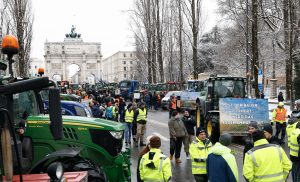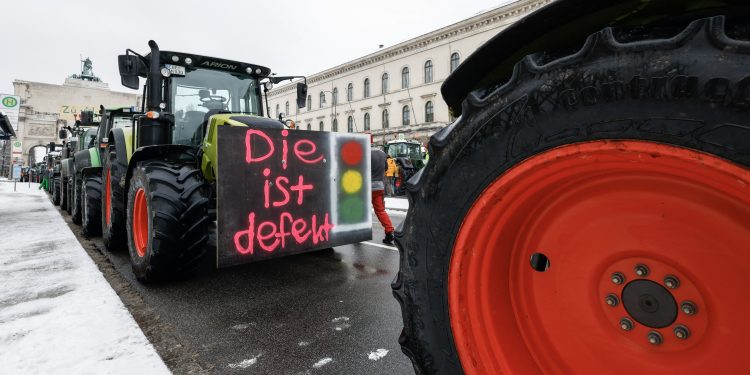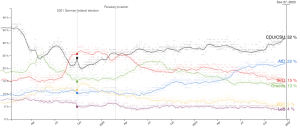Brussels – “The traffic light is broken.” Germany enters the European election year with one of the most worrying slogans for pro-European forces, as reported by posters of German farmers who took to the streets in most parts of the country yesterday (Jan. 8), the first day of a week of protests against the government led by Olaf Scholz. A very harsh protest that comes in the midst of not only an economic but also a political crisis for the so-called traffic light coalition – comprising the Social Democrats of the SPD (red), the Liberals of the FDP (yellow), and the Greens. In a fragmented picture on the German political chessboard, with elections for the renewal of the European Parliament five months away, all three governing parties collapsed since the fall of 2021, while the popularity of the popular but especially the extreme right is skyrocketing.

The farmers’ protest against the traffic light coalition’s plan to phase out diesel tax breaks clearly demonstrates the difficulties the Scholz government has in intercepting and responding to the demands of the electorate in Germany. The executive had to introduce the cuts in the 2024 draft budget after the Supreme Court halted the previously approved one in November. The government toned down initial proposals to cut all tax breaks for farmers but, despite this, there continues to be controversy from the agricultural sector, which denounces the risk of survival for professionals with low profit margins due to the elimination of diesel tax breaks. Chancellor Scholz, however, refused to receive further demands, sparking discontent among farmers and fueling street protests.
German authorities, however, fear that the far right could exploit these protests to rekindle social tension in Germany. “Right-wing extremists and other enemies of democracy are trying to infiltrate and instrumentalize the protests,” Interior Ministry led by Social Democrat Nancy Faeser warned, just days after one of the most disturbing episodes in the country’s recent history. On Thursday (Jan. 4), farmers prevented Germany’s vice-chancellor and minister of economic affairs, Robert Habeck, from getting off a ferry in Schlüttsiel (Schleswig-Holstein) as he was coming back from vacation. “There is a risk that the debate could become more and more brutal, undermining the law and the rule of law,” the German Greens’ co-chair warned. The Farmers’ Association distanced itself from the episode, condemning the incident involving Minister Habeck and ruling out collaboration with the far right: “At our demonstrations we do not want radical groups who wish to overthrow the government. We are democratic,” the organization’s president, Joachim Rukwied assured.
The fragmented political scenario in Germany
Yet it is to the right that one must look if one wants to analyze the political and social tension in Germany, which is dealing with the consequences of rising energy prices and economic recession. After decades of stability led by the traditional center parties – Christian Democrats and Social Democrats – since the establishment of the unprecedented traffic light coalition, the political scene has become increasingly fragmented, and it seems that the extremist forces can take advantage of the German crisis. The collapse of the three governing parties is striking if one compares the results of the September 26, 2021, national elections with the polls two and a half years later: The Social Democrats collapsed to 15 percent (-11 percentage points), the Liberals to 5 (-7) and the Greens to 13 (-2), which would bring the coalition as a whole to a -20 percent of voter preferences. Only the popular center-right of the Christian Democratic Union progressed — at 32 percent according to polls (+8 points) — but, more importantly, the far-right nationalists of Alternative für Deutschland, now considered the second-largest party at 22 percent (+12).

Middle: German Chancellor, Olaf Scholz, on the day the traffic light coalition was established (Nov. 24, 2021)
Although these polls will have to be tested at the ballot box, this trend has now been going on for months in Germany and already in elections of some Länder, votes increasingly turned to the right: at the Hesse and Bavaria elections on October 9, the AfD made its first political leap forward, while the Social Democrats, Liberals, and Greens all suffering significant defeats. Three former East German states – Brandenburg, Thuringia, and Saxony – will go to the polls this year and the far-right party is leading in all three. But the main focus should be on the European Parliamentary elections in June, when not only the AfD will test its electoral strength, but also new emerging parties looking to fish in the same vote pool.
The latest is – paradoxically – the one launched yesterday by one of the best-known faces of the German far left, Sahra Wagenknecht, former leader of Die Linke. She promises to save democracy in the European Union’s largest economy from the threat posed by the exponential growth of far-right parties by trying to intercept the same voters who are abandoning traditional centrist parties. The new party – the Sahra Wagenknecht’s Alliance (BSW), named after its founder – aims to reverse Germany’s course on unpopular initiatives of the Scholz government, such as environmental ones, but also on arms supplies to Ukraine, reducing the number of migrants, and improving State services. Then, on the other side of the political chessboard, there are the words of the former head of Germany’s national intelligence agency and former CDU, Georg Maaßen, who is ready to launch a new party (on the right) with a program that is not too different from that of the parties from which it wants to subtract voters. “What I notice with Wagenknecht, but also with the AfD, is that they talk freely about the problems we have in Germany,” Maaßen said. While the federal and regional elections have a 5 percent threshold, this obstacle does not exist in European elections. “They are very important because they will send a political signal at the national level,” Wagenknecht explained.
English version by the Translation Service of Withub



![Una donna controlla le informazioni sul cibo specificate sulla confezione [foto: archivio]](https://www.eunews.it/wp-content/uploads/2014/12/Etichette-alimentari.jpg)

